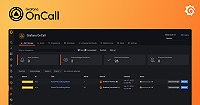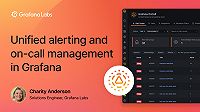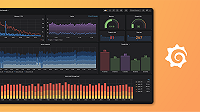Important: This documentation is about an older version. It's relevant only to the release noted, many of the features and functions have been updated or replaced. Please view the current version.
List alert groups
curl "{{API_URL}}/api/v1/alert_groups/" \
--request GET \
--header "Authorization: meowmeowmeow" \
--header "Content-Type: application/json"The above command returns JSON structured in the following way:
{
"count": 1,
"next": null,
"previous": null,
"results": [
{
"id": "I68T24C13IFW1",
"integration_id": "CFRPV98RPR1U8",
"route_id": "RIYGUJXCPFHXY",
"alerts_count": 3,
"state": "resolved",
"created_at": "2020-05-19T12:37:01.430444Z",
"resolved_at": "2020-05-19T13:37:01.429805Z",
"acknowledged_at": null,
"acknowledged_by": null,
"resolved_by": "UCGEIXI1MR1NZ",
"title": "Memory above 90% threshold",
"permalinks": {
"slack": "https://ghostbusters.slack.com/archives/C1H9RESGA/p135854651500008",
"telegram": "https://t.me/c/5354/1234?thread=1234"
},
"silenced_at": "2020-05-19T13:37:01.429805Z",
}
],
"current_page_number": 1,
"page_size": 50,
"total_pages": 1
}These available filter parameters should be provided as GET arguments:
idroute_idintegration_idstate
HTTP request
GET {{API_URL}}/api/v1/alert_groups/
Alert group details
curl "{{API_URL}}/api/v1/alert_groups/I68T24C13IFW1" \
--request GET \
--header "Authorization: meowmeowmeow"HTTP request
GET {{API_URL}}/api/v1/alert_groups/<ALERT_GROUP_ID>
Acknowledge an alert group
curl "{{API_URL}}/api/v1/alert_groups/I68T24C13IFW1/acknowledge" \
--request POST \
--header "Authorization: meowmeowmeow"HTTP request
POST {{API_URL}}/api/v1/alert_groups/<ALERT_GROUP_ID>/acknowledge
Unacknowledge an alert group
curl "{{API_URL}}/api/v1/alert_groups/I68T24C13IFW1/unacknowledge" \
--request POST \
--header "Authorization: meowmeowmeow"HTTP request
POST {{API_URL}}/api/v1/alert_groups/<ALERT_GROUP_ID>/unacknowledge
Resolve an alert group
curl "{{API_URL}}/api/v1/alert_groups/I68T24C13IFW1/resolve" \
--request POST \
--header "Authorization: meowmeowmeow"HTTP request
POST {{API_URL}}/api/v1/alert_groups/<ALERT_GROUP_ID>/resolve
Unresolve an alert group
curl "{{API_URL}}/api/v1/alert_groups/I68T24C13IFW1/unresolve" \
--request POST \
--header "Authorization: meowmeowmeow"HTTP request
POST {{API_URL}}/api/v1/alert_groups/<ALERT_GROUP_ID>/unresolve
Delete an alert group
curl "{{API_URL}}/api/v1/alert_groups/I68T24C13IFW1/" \
--request DELETE \
--header "Authorization: meowmeowmeow" \
--header "Content-Type: application/json" \
--data '{
"mode": "wipe"
}'| Parameter | Required | Description |
|---|---|---|
mode | No | The default value for this parameter is wipe. Using wipe will delete the content of the alert group but keep the metadata, which is helpful if you’ve sent sensitive information to OnCall. On the other hand, passing delete will fully erase the alert group and its metadata, as well as delete related messages in Slack and other platforms. |
NOTE:
DELETEcan take a few moments to delete alert groups because Grafana OnCall interacts with 3rd party APIs such as Slack. Please check objects usingGETto be sure the data is removed.
HTTP request
DELETE {{API_URL}}/api/v1/alert_groups/<ALERT_GROUP_ID>



